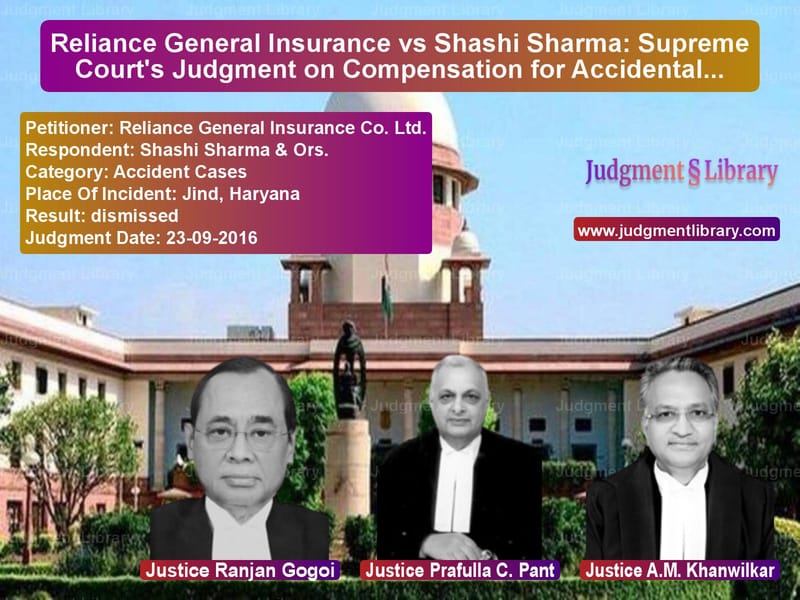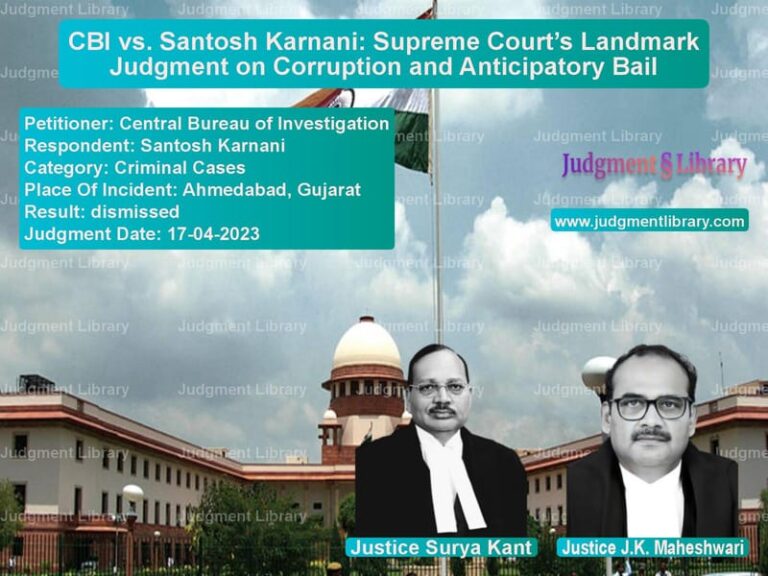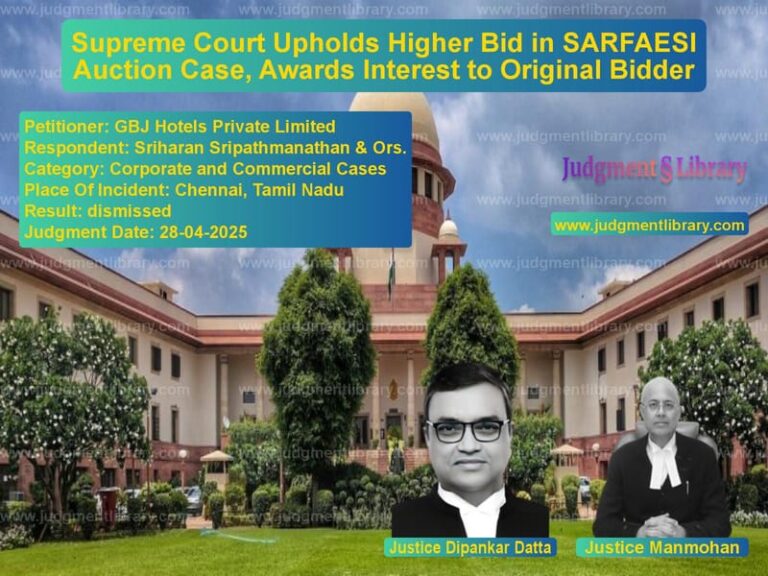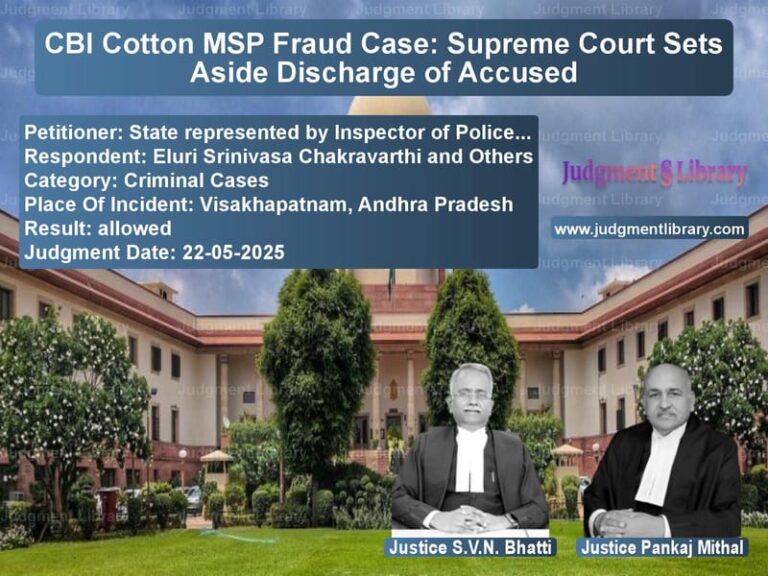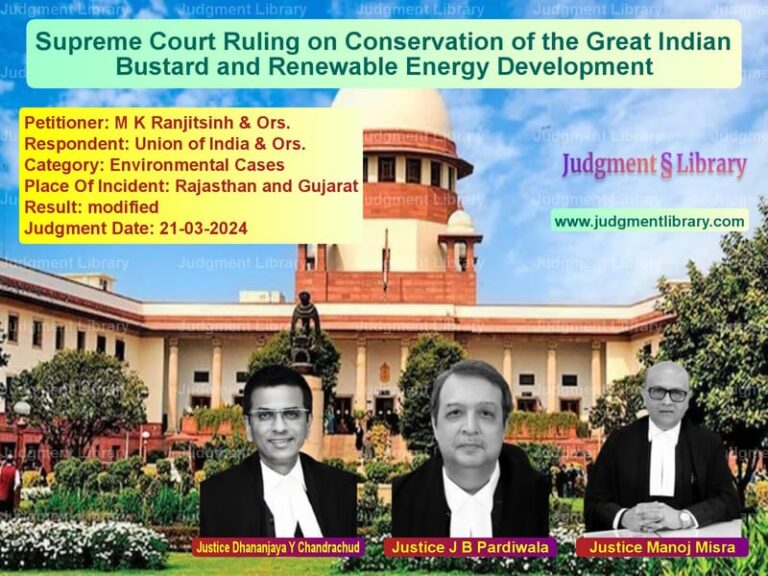Reliance General Insurance vs Shashi Sharma: Supreme Court’s Judgment on Compensation for Accidental Deaths
The Supreme Court of India, in the case of Reliance General Insurance Co. Ltd. vs. Shashi Sharma & Ors., ruled on a critical issue regarding the calculation of compensation in cases involving accidental deaths. The matter arose from a motor accident in Jind, Haryana, which resulted in the death of Dr. Ashwini Sharma. The claimants, being the dependents of the deceased, filed a petition before the Motor Accident Claims Tribunal (MACT) seeking compensation. The Court had to examine whether compensation received under the Haryana Compassionate Assistance Rules should be deducted from the final compensation amount, as well as whether double compensation should be allowed for the same loss.
Background of the Case
The claimants, family members of Dr. Ashwini Sharma, filed a claim for compensation following his death in a motor vehicle accident on October 24, 2010. The Tribunal initially awarded Rs. 4,50,000 as compensation, which was partially reduced due to compensation already received by the family under the Haryana Compassionate Assistance to the Dependents of Deceased Government Employees Rules, 2006 (Rules of 2006). The claimants contested the deduction, and the High Court ruled in their favor, holding that the amount received under the Rules of 2006 should not be deducted from the compensation amount payable under the Motor Vehicles Act.
The Supreme Court was called upon to decide whether the compensation under the Rules of 2006 should be deducted from the compensation under the Motor Vehicles Act, as the Insurance Companies contended, and whether the claimants should be allowed to receive double compensation.
Key Legal Issues
- Should the compensation received under the Haryana Compassionate Assistance Rules be deducted from the compensation payable under the Motor Vehicles Act?
- Is it appropriate to allow double compensation for the same loss?
- What is the proper interpretation of the term “just compensation” under the Motor Vehicles Act, 1988?
Arguments Presented in Court
Arguments by the Appellant (Insurance Companies):
- The Insurance Companies argued that the amount received by the dependents under the Haryana Compassionate Assistance Rules, 2006, must be deducted from the total compensation, as it was paid for the same loss under a different scheme.
- The Insurance Companies claimed that allowing double compensation would lead to an unfair financial windfall for the claimants.
- Relying on the case of Bhakra Beas Management Board vs. Kanta Aggarwal, they contended that compensation received from another source, such as the employer under a compassionate assistance scheme, should be deducted from the final compensation under the Motor Vehicles Act.
Arguments by the Respondents (Claimants):
- The claimants contended that the compensation received under the Haryana Rules was not related to the accidental death and should not be deducted from the compensation under the Motor Vehicles Act.
- The family argued that the assistance under the Haryana Rules was a service benefit provided to them because Dr. Ashwini Sharma was a government employee, and it should not be used to reduce the compensation awarded for the loss caused by the motor accident.
- They further stated that no double compensation would arise since the two payments served different purposes.
Supreme Court’s Observations
The Supreme Court reviewed the legal principles involved in the case, including the interpretation of compensation under the Motor Vehicles Act and the Haryana Compassionate Assistance Rules. The Court also examined previous case law, including Helen C. Rebello vs. Maharashtra State Road Transport Corporation, where the issue of double compensation was discussed.
The Court noted the following:
“Compensation for death resulting from a motor vehicle accident is distinct from compensation granted under the Haryana Compassionate Assistance Rules. The financial assistance provided under the Haryana Rules is not a payment for the same injury and does not fall within the same compensation framework.”
The Court also observed that the compensation payable under the Motor Vehicles Act is specifically aimed at addressing the pecuniary loss caused by the accidental death. It stated:
“The compensation under the Motor Vehicles Act is meant to address the loss of dependency caused by the death of the breadwinner, which is distinct from the service benefits provided under the Haryana Compassionate Assistance Rules.”
Final Judgment
The Supreme Court ruled in favor of the claimants, disallowing the deduction of compensation received under the Haryana Compassionate Assistance Rules. The Court held that:
- The amount received under the Haryana Compassionate Assistance Rules cannot be deducted from the compensation payable under the Motor Vehicles Act.
- The claimants are entitled to receive full compensation for the loss of dependency, as per the provisions of the Motor Vehicles Act.
- The Court emphasized that compensation under the Motor Vehicles Act should be just, fair, and adequate to address the pecuniary loss caused by the accidental death.
Implications of the Judgment
This judgment has far-reaching implications for the calculation of compensation in cases involving motor accidents, particularly where the claimant has received benefits from other sources, such as government assistance schemes. The ruling makes clear that:
- Double compensation is not permissible: While compensation under the Motor Vehicles Act should cover the full extent of loss, benefits from other sources that serve a different purpose, such as compassionate assistance, should not be deducted.
- The scope of “just compensation”: The Court has affirmed that the concept of “just compensation” under the Motor Vehicles Act includes ensuring that the claimants receive a fair amount for the loss of dependency, regardless of other benefits.
- Clarification on service benefits: The ruling clarifies that service benefits, such as those provided under the Haryana Compassionate Assistance Rules, are separate from compensation for accidental deaths and should not be treated interchangeably.
Conclusion
The Supreme Court’s ruling in the case of Reliance General Insurance Co. Ltd. vs. Shashi Sharma & Ors. provides valuable clarity on the principles governing compensation for motor accident deaths. By rejecting the deduction of compensation received under the Haryana Compassionate Assistance Rules, the Court ensures that claimants are fairly compensated for the loss of their breadwinner, without the unfair reduction of compensation due to benefits received from other sources.
Don’t miss out on the full details! Download the complete judgment in PDF format below and gain valuable insights instantly!
Download Judgment: Reliance General Ins vs Shashi Sharma & Ors. Supreme Court of India Judgment Dated 23-09-2016-1741883830801.pdf
Direct Downlaod Judgment: Direct downlaod this Judgment
See all petitions in Compensation Disputes
See all petitions in Motor Vehicle Act
See all petitions in Negligence Claims
See all petitions in Judgment by Ranjan Gogoi
See all petitions in Judgment by Prafulla C. Pant
See all petitions in Judgment by A M Khanwilkar
See all petitions in dismissed
See all petitions in supreme court of India judgments September 2016
See all petitions in 2016 judgments
See all posts in Accident Cases Category
See all allowed petitions in Accident Cases Category
See all Dismissed petitions in Accident Cases Category
See all partially allowed petitions in Accident Cases Category

